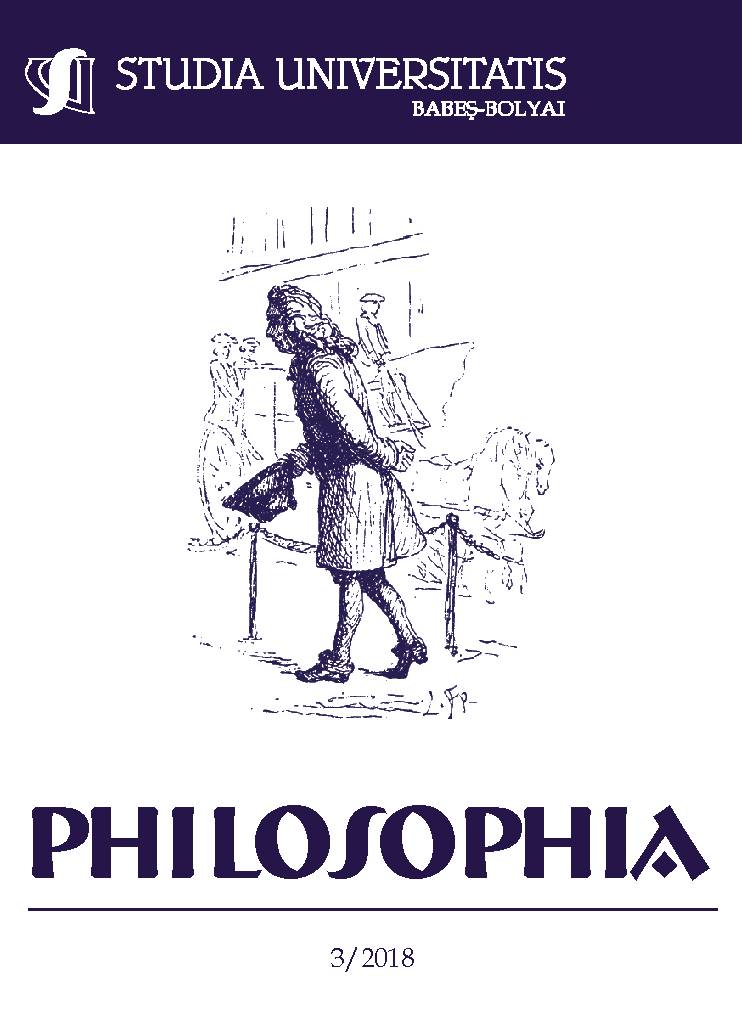DENYING THE PROBLEM. DEFLATIONISTS AND THE LIAR PARADOX
DOI:
https://doi.org/10.24193/subbphil.2018.3.04Keywords:
truth, paradoxes, the Liar paradox, the prosentential theory of truth, D. Grover, A. GuptaAbstract
Deflationary theories of truth had two different types of responses to the Liar. A first class of deflationists considers that this paradox does not represent a problem for their theories. On the other hand, other deflationists find the Liar to be a serious issue. This article focuses on the first class. Both Grover and Gupta consider that the Liar does not represent a problem for a deflationary theory of truth. For Grover, the paradox is demolished through the construction of the theory and for Gupta, the Liar is not the problem of the deflationist, but rather it concerns a specialist. Dorothy Grover (2005) is an advocate of the prosentential theory of truth. This theory considers that truth works as a prosentence. The sentence resulted by adding the truth predicate to a referring expression has the same content as the sentence picked out by the initial referring expression. A prosentence does not have a meaning by itself; it takes its meaning from its antecedent. Grover considers that the truth predicate used in the Liar fails to pick up an antecedent, thus it does not have operative meaning. The operative meaning comes from using a word in a specific context. Gupta (2005) considers that a specialist – not a deflationist – should give the proper answers to the paradoxes. A deflationist should not be concerned with how the paradoxes can be avoided. His only interest is how the T-schema should be interpreted in order to give the meaning of the truth predicate and how the deflationary conclusions are reached. Paradoxes do not count in as an issue for deflationists, because they are able to answer to their main questions without facing paradoxes. Therefore, the Liar is not a real issue for the deflationist. The main aim of this article is to offer some counterarguments for these two views. Grover’s difference between dictionary and operative meaning seems to make a distinction between accepted and restricted sentences. This distinction is needed in order to escape the problem of paradoxes. If this is the case, the Liar is an issue, but it is solvable. This is quite different from what Grover claims. On the other hand, Gupta’s approach may ease the deflationist’s work but it might destroy his theory.
References
Armour-Garb, Bradley, - “Deflationism and the Meaningless Strategy”, in Analysis, Vol. 61, No. 4, October 2001, pp. 280-289
_________ - “Minimalism, the Generalization Problem and the Liar”, in Synthese, Vol. 139, No. 3 (April 2004), pp. 491-512
_________ - “Horwichian Minimalism and the Generalization Problem”, in Analysis, Vol. 70, No. 4 (October 2010), pp. 693-703
Armour-Garb, Bradley and Beall, Jc, - “Should Deflationists Be Dialetheists?”, in Noûs, Vol. 37, No. 2, June 2003, pp. 303-324
_________ - “Minimalism, Epistemicism, and Paradox”, in Deflationism and Paradox, Ed. by Jc Beall and Bradley Armour-Garb, New York: Oxford University Press, 2005, pp. 85-96
Beall, Jc, - “A Neglected Deflationist Approach to the Liar”, in Analysis, Vol. 61, No. 2, April 2001, pp. 126-129
Eklund, Matti, - “What is deflationism about truth?”, in Synthese, 2017, pp. 1-15, accessed: https://doi.org/10.1007/s11229-017-1557-y, (20.07.2018)
Eldridge-Smith, Peter and Eldridge-Smith, Veronique, - “The Pinocchio paradox”, in Analysis, Vol. 70, No. 2 (April 2010), pp. 212-215
Field, Hartry, - “Review: Truth by Paul Horwich”, in Philosophy of Science, Vol. 59, No. 2, June 1992, pp. 321-330
_________ - Saving Truth from Paradox, New York: Oxford University Press, 2008
Grover, Dorothy, Joseph L. Camp Jr., Nuel D. Belnap Jr. - “A Prosentential Theory of Truth”, in Philosophical Studies: An International Journal for Philosophy in the Analytic Tradition, Vol. 27, No 2 (Feb. 1975), pp. 73-125
Grover, Dorothy, - “How Significant If the Liar?”, in Deflationism and Paradox, Ed. by Jc Beall and Bradley Armour-Garb, New York: Oxford University Press, 2005, pp. 177-202
Gupta, Anil, - “A Critique of Deflationism”, in Philosophical Topics, Vol. 21, No. 2 (Spring 1993), pp. 57-81.
_________ - “Do the Paradoxes Pose a Special Problem for Deflationism?”, in Deflationism and Paradox, Ed. by Jc Beall and Bradley Armour-Garb, New York: Oxford University Press, 2005, pp. 133-147
Horwich, Paul, - (1998). Truth, 2nd edition, Oxford: Oxford University Press, 1998
_________ - “A Minimalist Critique of Tarski on Truth”, in Deflationism and Paradox, Ed. by Jc Beall and Bradley Armour-Garb, New York: Oxford University Press, 2005, pp. 75-84
_________ - Truth – Meaning – Reality, Oxford: Oxford University Press, 2010
Keene, G. B., - “Self-Referent Inference and the Liar Paradox”, in Mind, New Series, Vol. 92, No. 367 (Jul., 1983), pp. 430-433
Kripke, Saul, - “Outline of a Theory of Truth”, in The Journal of Philosophy, Vol. 72, No. 19, (Nov. 6, 1975), pp. 690-716
Levi, Don S., - “The Liar Parody”, in Philosophy, Vol. 63, No. 243 (Jan., 1988), pp. 43-62
Martinich, A. P., - “A Pragmatic Solution to the Liar Paradox”, in Philosophical Studies: An International Journal for Philosophy in the Analytic Tradition, Vol. 43, No. 1 (Jan., 1983), pp. 63-67
Priest, Graham, - “Boolean Negation and All That”, in Journal of Philosophical Logic, Vol. 19, No. 2, May 1990, pp. 201-2015
__________ - In Contradiction, New York: Oxford University Press, 2006
Rieger, Adam, - “The Liar, the Strengthened Liar, and Bivalence”, in Erkenntnis (1975-), Vol. 54, No. 2 (2001), pp. 195-203
Simmons, Keith, - “Deflationary Truth and the Liar”, in Journal of Philosophical Logic, Vol. 28, No. 5, October 1999, pp. 455-488
Tarski, Alfred, - “The Semantic Conception of Truth and the Foundations of Semantics”, in Philosophy and Phenomenological Research, Vol. 4, No.3 (March 1944), pp. 341-375
Yablo, S., - “Truth and reflection”, in Journal of Philosophical Logic, Vol. 14, No. 2, 1985, pp. 297-348
__________ - “Paradox Without Self-Reference”, in Analysis, Vol. 53, No. 4, 1993, pp. 251-252.
Downloads
Published
How to Cite
Issue
Section
License
Copyright (c) 2018 Studia Universitatis Babeș-Bolyai Philosophia

This work is licensed under a Creative Commons Attribution-NonCommercial-NoDerivatives 4.0 International License.



